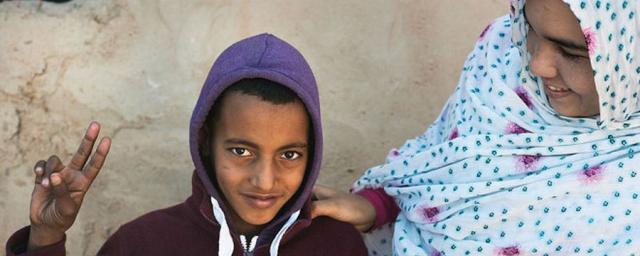
On the occasion of the 40th anniversary of the Sahrawi refugee camps in the Southwest Algerian desert, 40 Sahrawi refugees have lent their faces to the 40 faces 40 years photo exhibition in an attempt to shed a light on an entire generation that never experienced anything other than life as a refugee.
These 40 men and women live in the heart of the Sahara desert. In a remote and harsh environment, without plants and water, subject to extreme temperatures, they remain heavily dependent on humanitarian aid.
Fahda's story
One of them is Fahda Bachir Mohamed, 27 years old. Born in the Laâyoune refugee camp, Fahda has four sisters and two brothers. She has a degree in political science, specialising in international relations. Today she works as a nutrition awareness monitor in the camps (working for a humanitarian organisation).
“I was born here, and all my life I have been dependent on humanitarian aid from abroad. I was born into a conservative family who support the cause of the Sahrawi people and their struggle for freedom. My childhood was spent as a refugee, in difficult conditions: scant resources and very basic living conditions.
In this inhospitable desert, there are no plants or animal life. The summer is very hot and the winter very cold, and I was living in these conditions without adequate clothes, shoes or health services. I didn't have any toys either. We picked up what we could find and tried to imitate others' games. When there was a bit of rain that formed a puddle, everyone rushed to see it: we dreamed about seeing the sea.
A doll made with a bone
I couldn't experience or enjoy my childhood in the same way as other children my age around the world. I remember my mother used to bend over backwards to make me happy. I remember one time when she found a bone, she covered it in a bit of material and drew a face on it, and made it into a doll that she gave to me. I remember I was so happy and so proud of that new doll, I took it with me to play with my friends.

I also remember that when I was hungry, she used to say to me: "Be patient, my little girl. I'm going to give you everything you want". So I waited. Until I ended up falling asleep until the next morning. She didn't say that to be dishonest or to trick me; we just didn't have the means. That is just a small example of everything we have suffered and everything that the Sahrawi children are still suffering.
Education above all
However, thanks to God and to the efforts of humanitarian NGOs and the Sahrawi authorities [who run the camps], we have been fortunate enough to have several schools in the camps: education and culture are so important in the life of a people.
“When I was a child we had no toys, we retrieved whatever we could find and we tried to imitate the games of the other kids. When a little rain made a puddle, everybody ran towards it : we dreamed of seing the see.”
When doing our studies, we would have liked to go to prestigious schools and have teachers who are respected doctors, so that everyone can be taught in the camps.
For secondary school and college, I was fortunate enough to be able to go and study in Algeria [thanks to a grant from the Algerian government], and then to go to university, where I studied political sciences. It was our cause that influenced my choice of specialisation, because I wanted to be able to better defend it.
No jobs, no prospects
However, whether you are educated or not, you have no prospects when you go back to the refugee camps, and no work. You can't do anything with all that knowledge because you're not at home. Even I haven't got any future prospects, despite having a degree. But because I lived away from my parents during all those years of studying, I want to be with them now, to share their suffering, until the day when they can go back to their homeland.
In spite of everything, even if we stay here for 100 years, we still hope to set foot in our free country and run it ourselves, however many years we will have spent here. Even though we have been here for years and we think of this desert a bit like a second home, we still have this sensation of not being at home. 40 years is too long in exile.
40 tough years
We're not like the rest of the world, in towns and cities, with the means they need to live. We have families that have been split in two [between territories under Moroccan control and the refugee camps] and extremely difficult living conditions. 40 tough years, 40 years of suffering.
This photo project that I'm posing for here to mark the 40th anniversary of these refugee camps is very important, because there must be a lot of people who don't know about this crisis, and it will help them learn about the suffering of our people, here in the refugee camps. I hope they will appreciate this small part of my life, which is not only mine, but also that of all young Sahrawis.”